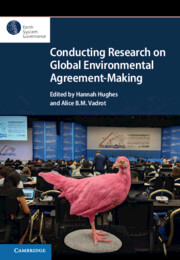Book contents
- Conducting Research on Global Environmental Agreement-Making
- Series page
- Conducting Research on Global Environmental Agreement-Making
- Copyright page
- Dedication
- Contents
- Figures, Tables and Boxes
- Contributors
- Preface
- Acknowledgements
- Abbreviations
- 1 Introduction
- Part I Developing a Methodology
- Part II Navigating Sites
- Part III Collecting and Analysing Data
- Part IV Implementing and Adapting
- Index
- References
Part I - Developing a Methodology
Published online by Cambridge University Press: 07 August 2023
- Conducting Research on Global Environmental Agreement-Making
- Series page
- Conducting Research on Global Environmental Agreement-Making
- Copyright page
- Dedication
- Contents
- Figures, Tables and Boxes
- Contributors
- Preface
- Acknowledgements
- Abbreviations
- 1 Introduction
- Part I Developing a Methodology
- Part II Navigating Sites
- Part III Collecting and Analysing Data
- Part IV Implementing and Adapting
- Index
- References
Summary

- Type
- Chapter
- Information
- Publisher: Cambridge University PressPrint publication year: 2023

